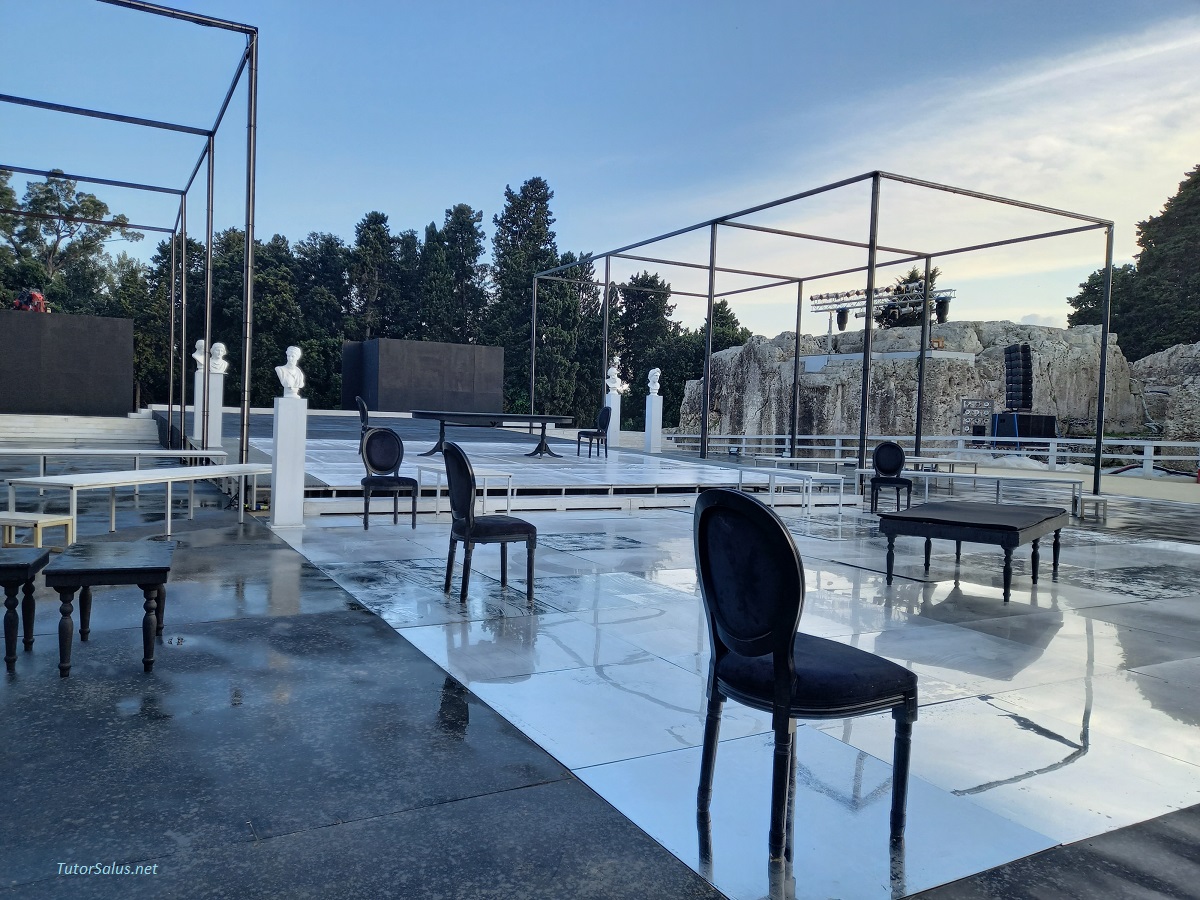in Order.
Medea 2023

Empty chairs on a checkered, wax polished floor : it is the horizon of ‘Medea’[1] nice stage setting by Marco Rossi, for the ‘Greek Theater’ at Siracusa (Sicily), directed by Federico Tiezzi.[2]
Well introduces the risky mind of Medea the Chorus of young people in white tunics, a rythmic, primitive, children song : and well recalls - that dull thud at the end of each verse – a thin ridge which stands between the pride of the gods and the death of humans.
Not human infact Medea is : nor does she wants to become one. She tried indeed to stay among them, their talent of a self-silence[3] which gods disregards : she raised his own Jason to glory[4] and like a bride she followed him, even giving him two children.
But it occurred that Jason, after landing with her at Corinth, suddenly remembered that he was a Greek man and Medea less than nothing.
He decided to come forward with king Creon, and to ask his young daughter to marry him : Medea can thank Jason for the lucky landing, thank the indulgence of Creon who doesn’t think of killing her, and then thank all of Greece offering her Laws and how to administer Justice, instead of the barbarous Vengeance of the lands of Colchis from which she comes from.
The swerve of Medea is then immediate and without nostalgia : her lineage from Sun god doesn’t bring her affections – neither to her children nor to others – but a disconcerting, criminal reasoning.
Criminal ?
No criminal, Medea is divine! She leaves the maids to wash the blood of that hecatomb, her own Job!
Like the imperial Eagle which never abandons her, Medea stands above humans, whirling over them relentlessly : even when, long gone from the human Court which deceived itself about being able to condemn her, she instead – radiant – mocks the annihilated Jason from above the winged chariot of her own Sun, which already brings her to new life with a future, fragile king. Aegean is infact waiting for her.
The pleasant direction by Federico Tiezzi wisely respects the parts, so taking a qualitative leap to the obscure text of Euripides : excellent as a matter of facts are the choreography and the scenes, the music and the choirs; and very convincing indeed are all the interpreters – the ambiguous Jason, the truthful Messenger woman, the poor Creon, and going up to a hardest Medea, which the skilful Laura Marinoni carries with humility lovingness sensitivity, distancing the memory of that Medea / Callas too poignant and passionate[5], to instead bring back the truth of the outburst of pride which disconcerts, because we imagine it screwed into male virility and not to whom, like a woman, even physically went through a gestation and childbirth.
Gods however do not give birth – it is the message from Euripides, hiding here a sudden, not avoidable weakness of the work which infact earned him an early distrust from the Judges[6] of the time – and the divine Medea turns to the only master who enslaves her, the super-human pride that bends her, and restore her ‘to Order’.
Insanity is rejecting without resistance any bond, but only insanity makes it ‘natural’, because no unconscious - before Freud[7] we didn’t hear about– can ever really be like ‘in the open sky’, as someone still keeps saying.
Very difficult and rare is being able to bring again on a stage – large and open, then, as the ‘Greek Theater’ of Siracusa – that outburst of mind which is indeed a disconcerting passage of pathology, and which can be kept silent, but never removed by one’s memory.
Marina Bilotta Membretti / Cernusco sul Naviglio – July 9, 2023
[1] ‘Medea’, by Euripides / Siracusa ‘Greek Theatre’ 2023 Theater Season www.indafondazione.org Directed by Federico Tiezzi; Translation by Massimo Fusillo; Scene designer by Marco Rossi; Prologue original music by Silvia Colasanti, with the children’s choir and orchestra from the ‘Teatro dell’Opera’ of Rome directed by G. Sabbatini and C. Donadio; Stage manager : Nanni Ragusa; Chorus leader : Simonetta Cartìa; Main performers : Laura Marinoni, Alessandro Averone, Roberto Latini, Sandra Toffolatti, Luigi Tabita, Debora Zuin, Riccardo Livermore and with the participation of the students of the ‘Accademia d’Arte del Dramma Antico’ of Siracusa.
[2] Federico Tiezzi is an actor, dramatist, and theater director : he took care of his first direction at the age of fourteen, with ‘The liar’, by Carlo Goldoni; his own points of reference are the ancient classical works, as well as authors like Allen Ginsberg, Federico Garcia Lorca, Pier Paolo Pasolini, Bertolt Brecht. He is graduated in ‘Art history’ : he founded the
The theater company ‘Il Carrozzone’ (Ubu Prize 1979 and 1980 for the best Italian experimental theater company), now company ‘Lombardi-Tiezzi.
[3] ‘Il pensiero di natura. Dalla psicoanalisi al pensiero giuridico’, by Giacomo B. Contri – SIC Edizioni (1998) Cap. III ‘I sessi nella legge’ – ‘Talento negativo’, p. 155.
[4] Thanks to the support of Medea, princess and high priestess in Colchis, Jason – fleeing from Iolcus where his father king was deposed – could take possession of the ‘Golden fleece’, belonged to the winged ram of Hermes, and believed to have magical powers.
[5] ‘Medea’ (1969 film) was written and directed by Pier Paolo Pasolini, with Maria Callas as Medea.
[6] Up to five Judges were called for the Theater competition : Euripides got only the third place for ‘Medea’, which was part of the trilogy he presented to the contest among Tragedies, at the ‘Grandi Dionisie’ in 431 a.C., year of the opera’s premiere at the ‘Dionysus Theater’ in Athens.
[7] ‘Das Unbehagen in der Kultur’ (‘Discomfort in Culture’), S. Freud (1929-1930).